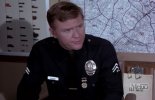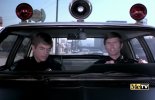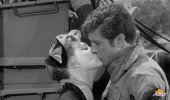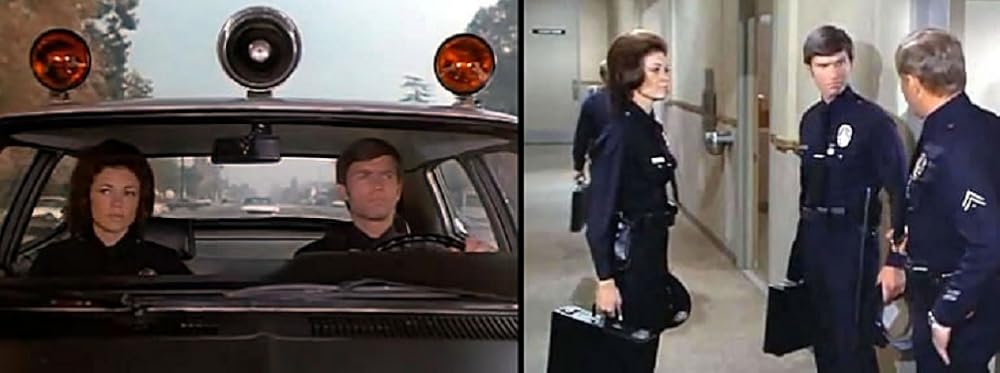Post-50th Anniversary Cinematic Special
The Great Gatsby
Directed by Jack Clayton
Starring Robert Redford and Mia Farrow
Premiered March 27, 1974
1975 Academy Awards for Best Costume Design (Theoni V. Aldredge); Best Music, Scoring Original Song Score and/or Adaptation (Nelson Riddle)
Wiki said:
The Great Gatsby is a 1974 American historical romantic drama film based on the 1925 novel by F. Scott Fitzgerald. The film was directed by Jack Clayton, produced by David Merrick, and written by Francis Ford Coppola. It stars Robert Redford, Mia Farrow, Sam Waterston, Bruce Dern, and Karen Black. The plot concerns the interactions of writer Nick Carraway with enigmatic millionaire Jay Gatsby (Redford) and Gatsby's obsession to reunite with his former lover, Daisy Buchanan (Farrow), amid the riotous parties of the Jazz Age on Long Island near New York City.
This is another one of those films that they showed us in school. Revisiting it for the first time in decades, I remember why I found it so intriguing. The story takes its time getting revved up, but once it gets going, I find it pretty captivating. As a romantic early twentieth-century period piece, I always associated with the later
Somewhere in Time.
Wiki said:
Nick Carraway [stick around after the film, Sam Waterston wants to talk to you about your investments] pilots his boat across the harbor to his cousin Daisy and her husband Tom’s [Bruce Dern] mansion in East Egg.
Carraway, an investment broker, is the book's narrator, a role that carries over into the film. Though the direct narration takes a back seat once the plot gets going and Gatsby's in the story. I'd accuse the prose of being too florid, but I assume it's straight out of the book, which I own a copy of, but I only read it once or twice back in the '80s.
The opening narration occurs over an amusing sequence of Nick navigating the bay between West Egg and East Egg in a small motorboat while being buffeted by the passing of larger sailboats. At Buchanan manor, we also meet Daisy's friend, golf champion Jordan Baker (future Bond girl Lois Chiles), who's based on an actual socialite acquaintance of Fitzgerald's.
What Gatsby?
This scene goes on to established that Tom's a vocal white supremacist, though that characteristic doesn't play much of a role in a film with an almost entirely white cast. (The only characters of color I caught were a black couple who serve as accident witnesses later in the story.)
While there, he learns Tom and Daisy's marriage is troubled and Tom is having an affair with a woman in New York. Nick lives in a small cottage in West Egg, next to a mysterious tycoon named Gatsby, a former Oxford student and decorated World War I veteran, who regularly throws extravagant parties at his home.
Gatsby, who's seen staring across the bay at the Buchanans' blinking green dock light (which becomes one of the film's symbolic elements), looms large in Nick's vicinity; his outdoor parties are very visible and audible from Nick's porch.
Having done a bit of searching, apparently West and East Eggs don't exist, but are based on the Great Neck and Cow Neck peninsulas, which are separated by Manhasset Bay.
Tom takes Nick to meet his mistress, Myrtle [Karen Black], who is married to George Wilson [Scott Wilson], an automotive mechanic. George needs to purchase a vehicle from Tom, but Tom is there only to draw Myrtle to his city apartment.
Tom and Myrtle
The dog vendor is played by Arthur Hughes. Tom and Myrtle throw their own parties at their place in the city. At the one Nick attends, he meets Myrtle's sister, Catherine (dark damsel Kathryn Leigh Scott), who's been to one of Gatsby's parties and gossips about him.
How Tom and Myrtle Met
I found the extreme close-up accompanied whispery dialogue there pretty annoying. For this we didn't get the scene of Jay and Daisy dancing?
There she taunts him with Daisy's name.
Making a scene of it at the party. Nick, clearly the temperamental brute, slaps her nose bloody.
Back on Long Island, Daisy wants to set Nick up with [Jordan].
Tom and Daisy, by contrast, have elegant garden parties by day. Daisy shares with Nick her recurring issues with being a woman--that girls should be "beautiful little fools"--which she projects onto her daughter, Pamela (Patsy Kensit); and seems envious of Jordan, whom she describes as "immoral".
When Nick and Jordan attend a party at Gatsby's home, Nick is invited to meet Gatsby privately, who asks him to lunch the following day.
Furthering the party contrasts, Gatsby's parties--already established to be loud and by night, are quite bawdy, with a live band and Charleston dancing. Nick runs into Jordan at the party, finding her chatting with a guy who's apparently supposed to be Groucho. Gatsby is nowhere to be seen among his guests, who also exchange colorful, larger-than-life gossip about him. By the time Nick is nervously taken by Gatsby's bodyguard (John Devlin)--whom he just witnessed very efficiently taking down a larger guest who got out of hand--to see the host in private, the anticipation has built for over a half hour.
The next day, Gatsby takes Nick for a ride in his roadster and seems too eager to share a brief story of his life that we'll learn was partly fabricated; though he was actually decorated in the war. This segues into a business proposal.
At lunch, Nick meets Gatsby's business partner Meyer Wolfsheim [Howard Da Silva], a Jewish gangster and gambler who rigged the 1919 World Series.
Meyer Wolfsheim
This is when holes start to appear in Gats's just-delivered story. Tom Buchanan pops up at the place and briefly meets Gatsby, though this doesn't seem to serve much of a purpose in the film's story.
The following day, Jordan appears at Nick's work and asks him to invite Daisy to his house so that Gatsby can meet with her.
Nick learns that Gatsby's been keeping tabs on Daisy and looking for her at his parties. Gatsby has Nick's grass cut, floral displays delivered to his home--all white roses--and brings over servants to with ostentatious silver tea sets. Gatsby seems nervous and expresses second thoughts while they wait for Daisy to arrive.
Gatsby surprises Daisy at lunch. It is revealed that Gatsby and Daisy were once lovers, though she would not marry him because he was poor.
Gats subsequently takes Daisy to see his mansion, which was the plan all along. Gats introduces her and Nick to a long-term house guest, Klipspringer (still mildly traumatized by almost seeing Edward Herrmann's junk in
The Paper Chase), who--at a request made to keep him out of the way--performs "Ain't We Got Fun" on a gilded grand piano in his PJs. As Gats shows off his lavish wardrobe, Daisy oddly weeps over his "beautiful shirts".
Jay and Daisy, who met while he was serving as a lieutenant and she lived in Louisville, become reacquainted in private, and she marvels at his detailed collection of clippings about her.
Daisy and Gatsby have an affair, which soon becomes obvious.
The cuts in the film emphasize how Daisy's seeing Gats while Tom's seeing Myrtle and the simple-minded, guileless George remains oblivious at his service station with the large, bespectacled eyes on an oculist's billboard symbolically looming over it. At Jay's insistence, Daisy relates how she met Tom.
Tom and Daisy subsequently attend one of Gats's parties. Tom is familiar with but disdainful of many of the guests, which include various celebrities, including a senator. Gats steals away with Daisy to Nick's house while Tom's preoccupied meeting showgirls. Guests jump into the fountain to dance in a moment reminiscent of the pool scene in
It's a Wonderful Life. As the Buchanans leave by daybreak, Tom's upset to learn that a giddy Daisy's been with Gatsby the entire night. Alone later, Jay frets with Nick that Daisy didn't have a good time.
Nick: You can't repeat the past.
Jay: Can't repeat the past? [With ominous earnestness] Of course you can.
Tom takes an interest in learning about Gatsby, chiefly concerned with where his money comes from. A subsequent solo visit by Daisy to the mansion gives us the movie's memorably romantic centerpiece, as Jay dons his uniform to dance with Daisy to the accompaniment of the song that serves as the movie's haunting main theme, Irving Berlin's "What'll I Do". Jay presents her with an emerald ring--inspired by the color of her dock light--which she tells him to wear for her.
While they're seeing each other, a reporter visits Nick to ask questions about Gatsby, particularly his connection with Wolfsheim. Gatsby lets his servants go to keep his affair secret, while Nick finds a dead seagull washed up on the shore.
While Tom and Daisy entertain Gatsby, Jordan, and Nick at their home,
...Jay's taken aback to meet Pamela, which seems to momentarily sober him up. Jay's so fixated on recreating his month-long romance with Daisy that he's erroneously frozen her in time.
Daisy, on a hot summer day, proposes they go into the city as a diversion.
Tom swaps cars with Jay, Tom taking Nick and Jordan while Jay takes Daisy. A frustrated Tom stops at Wilson's station for gas. George seems upset at something he's learned about his wife and shares his plan to take her back west. Myrtle desperately tries to get Tom's attention by pounding on an upstairs window so hard that she puts her hand through the glass.
Ohmigod, is this the suite that the Beatles will stay in!?!
Gatsby and Daisy reveal their affair.
Tom's well aware, confronting Gatsby about the affair.
Gatsby wants Daisy to admit she never loved Tom.
But she can't bring herself to do it.
The others return separately to the island.
Meanwhile back at the station house, George and Myrtle have a fight about his planned move in which she vocalizes her resentment of him.
Myrtle: You're so dumb you don't know you're alive.
George tries to stop her from running out. Later that night, Tom stops his car because of a public commotion at the station. As witnesses are being questioned by the police, they learn that Myrtle was killed by Gatsby's car in a hit-and-run accident; while George intensely grieves. Tom assumes that Gatsby was driving.
Tom's party finds that Daisy's home, and Nick finds Jay secretly waiting outside, concerned primarily with Daisy's well-being in the aftermath of the accident. There's a nifty segue shot of the glasses in the billboard dissolving into the headlights of the bloodied car and its smashed fender. At the station, a friend (Elliott Sullivan) tries to console George, who produces a diamond dog leash that Myrtle was hiding, when they don't own a dog. Believing that it was the man who was seeing Daisy who killed her, George stumbles out into the night talking to himself while carrying a paper bag.
The next morning back at West Egg, Nick learns over a shared cigarette that it was Daisy who was driving, and Jay describes how Myrtle (apparently thinking Tom was driving) rushed out in front of the car trying to get their attention. (Note that Gatsby's not in the know about Myrtle, and Nick doesn't enlighten him.) Nick advises Jay to get away to Montreal(!!!) until the incident blows over, but he insists on staying because he's sure that Daisy will be coming back to escape with him.
In East Egg, we see a brief moment of Tom and Daisy seeming to bond over her telling him what happened. George shows up with his bag and Daisy's horrified to learn who he is while Tom talks to him. Running out, Daisy has a moment with Pamela that confirms her self-image as a "beautiful little fool".
As Nick returns to his house after what will be his final meeting with Gatsby, he turns and shouts out, "They're a rotten crowd! You're worth the whole damn bunch put together!"
Believing that Gatsby killed his wife, George later goes to Gatsby's mansion...
Nick holds a funeral for Gatsby. There he meets the man's father [Roberts Blossom] and learns Gatsby's original name is "Gatz". No one else attends the funeral.
Nick learns that Jay's been taking care of his father while keeping his distance (part of his story having been that he inherited wealth from deceased parents), and that Mr. Gatz has been fed his own story about his son's success. Nick's particularly bothered that neither Wolfsheim nor Daisy come around after Gatsby's death.
Afterward, Daisy and Tom continue with their lives as though nothing occurred.
Nick and Jordan run into them at the Plaza while they're leaving for a getaway to Europe. Nick confronts Tom about what he told George (which the audience is never privy to), and Tom maintains that Gatsby was the driver. Daisy seems like she might be at least partly blocking things out, and it's unclear how much she knew about Myrtle, but she's at least damned for leaving Jay to take the rap for her.
Nick breaks up with Jordan and moves back to the Midwest, frustrated with Eastern ways. He laments Gatsby's inability to escape his past.
The bottom-line takeaway is that Jay was too fixated with that one moment in time, letting it define him while not recognizing that the object of his desire may have moved on in life. While it motivated him to make himself everything that he was, he might have channeled that ambition into moving forward. Daisy, while happy to engage in her romantic fling with him, wasn't as into him as he was into her, and wasn't willing to uproot her life for him.
I had this on a 48-hour iTunes rental for the weekend. If I'd had more time, I might have reread the book before engaging in a rewatch.
Wiki said:
The film received mixed reviews, being praised for its faithful interpretation of the novel but also criticized for lacking any true emotion or feelings towards the Jazz Age.
Wiki said:
Despite a mixed reception by critics, the 1974 film grossed over $26 million against a $7 million budget. Coppola later stated that the film failed to follow his screenplay
I think "Sail On, Sailor" may have been reminding me of "Lights," by Journey.
That is kind of musically similar, now that you bring it up.
Yup, it premiered the same night as Night Stalker-- so there was POTA at 8pm,
Up against
Kung Fu for part of the season.
Six-Million-Dollar Man at 9am (in progress, I think),
Part of the season 8:30, part at 9:00.
This was actually the first TV series that I bought on DVD. I think it was released to coincide with that terrible reboot movie. There were not a lot of shows on DVD at the time, I don't think.
Its brevity probably made it more home video release-friendly at a time before having full seasons sets of TV shows was common. I recall you advising once that it was a mediocre series.
Four episodes about inflation. Sounds interesting.

Well, it would be about what the characters do to make ends meet.
Going for the laugh, although it makes him sound a little condescending.
I think even for people our ages, who were born after Einstein died, he was the go-to example of a genius for most of our lives; so it didn't come off as natural.
The B-Side actually made me think of the "bring home the bacon" song.

A common blues motif described as a "stop-time riff" that Muddy Waters apparently originated with "Hoochie Coochie Man," and Diddley helped to popularize.
Life in the sewers makes a man tough.
I'm thinking of Norton as more of a Fredo type.
Well, there's one other song about the same time that I recall that showcases Alice's more sensitive side. But I actually can't remember any other singles after that at all.
Guess we'll see as they come up.
I'm talking about the accident, the physical and psychological trauma, the suicidal ideation, the physical therapy, and so on, which was the majority of the plot of Steve's origin. By the time they got to Jaime's origin, it was "Oh, look, I have super powers."

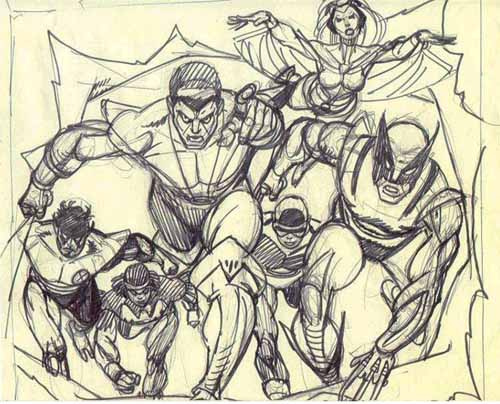
marvel.fandom.com





